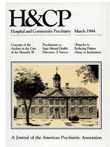The Impact of Discharge Planning on Chronic Schizophrenic Patients
Abstract
The authors studied the discharge planning process at four inpatient facilities and its impact on 119 chronic schizophrenic patients over a one-year period. Adequacy of discharge planning varied significantly among the inpatient units; the authors attributed this variance to communication between inpatient and outpatient staff, staff-patient ratios, and staffeffort. Overall, staff were most thorough in planning drug treatment andaftercare and least thorough in planning living arrangements in the community. The autborsfound that adequacy of discharge planning for after care treatment as well as patients' economic situations significantly influenced both treatment compliance at three-month f ollow-up and rates of early rehospitalization.
Access content
To read the fulltext, please use one of the options below to sign in or purchase access.- Personal login
- Institutional Login
- Sign in via OpenAthens
- Register for access
-
Please login/register if you wish to pair your device and check access availability.
Not a subscriber?
PsychiatryOnline subscription options offer access to the DSM-5 library, books, journals, CME, and patient resources. This all-in-one virtual library provides psychiatrists and mental health professionals with key resources for diagnosis, treatment, research, and professional development.
Need more help? PsychiatryOnline Customer Service may be reached by emailing [email protected] or by calling 800-368-5777 (in the U.S.) or 703-907-7322 (outside the U.S.).



